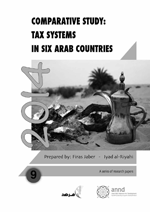Social Watch News
|
Published on Fri, 2014-11-28 13:32
|
|
Published on Fri, 2014-11-21 14:16
|
Published on Fri, 2014-11-21 12:35
The Arab NGO Network for Development (ANND), in collaboration with Christian Aid and Social and Economics Policy Monitor Palestine, explore in their comparative study on “Tax Systems in Six Arab Countries” how the tax systems of Arab countries have contributed to the lack of opportunity, growing inequalities, marginalization and exclusion suffered by the majority of people living in the Arab region. The revolutions witnessed by some countries in the region and the instability and crises in others are in part a demonstration of the people’s rejection of these inherent structural disparities. Paradoxically, as the report shows, it is the tax policies of these countries that present one of the key means by which local resources could be redistributed and mobilized to restore socio-economic justice to the poor and to foster more self-reliant development.
|
Published on Fri, 2014-11-21 11:56
Private military and security companies (PMSCs) have become a relevant topic in international relations and in academic literature during the last decades: the case of Executive Outcomes in the 90s, the well-known actions of Blackwater in Iraq, and G4S controversial practices are good examples of this. The controversial collaboration of these companies with the United Nations has rarely been an open discussion, neither in the public sphere nor in academia. However, in recent years, several studies have attempted to illuminate this relationship, including the work of Lou Pingeot.
|
Published on Fri, 2014-11-21 10:32
In a letter submitted to the UN Secretary General, RightingFinance addressed a number of requests in regards to financing aspects of the upcoming Synthesis Report that the Secretary General’s office is preparing as input for the intergovernmental negotiations on the Post-2015 Development Agenda Summit.
The letter makes reference to the human rights audit that RightingFinance carried out on the Intergovernmental Committee of Experts on Sustainable Development Finance report, assessing it from the perspective of international human rights principles including those of maximum available resources, non-retrogression, minimum core, non-discrimination and equality, participation, transparency and accountability, access to justice and access to remedies.
|
|
Published on Fri, 2014-11-14 18:38
|
Published on Fri, 2014-11-14 14:43
As intergovernmental discussions commence on a major financing for development conference to be held in Addis Ababa, Ethiopia in July 2015, differing priority issues between developed and developing countries are already seen.
The process for the International Conference on Financing for Development (FfD) commenced in the New York headquarters of the United Nations on 17 October 2014.
The third FfD conference, which will be held in Addis Ababa, from 13 to 16 July 2015, will gather high-level political representatives, including heads of state and government, ministers of finance, foreign affairs and development cooperation, as well as all relevant institutional stakeholders, non-governmental organizations and business sector entities.
|
Published on Fri, 2014-11-14 08:44
2015 will be a landmark year for the global fight against poverty and for equitable and sustainable development, with three crucial summits in just six months. A central issue for all three summits is concrete proposals for reforms to international financial and trade systems so that they support the achievement of global sustainable development goals. Such reforms should be based on the right to development for all countries and ensuring economic and social rights for all. There are sufficient funds available to achieve human rights for all, end poverty and to achieve global sustainable development goals: but political decisions to change structures and systems are needed to make this possible. On these issues, the Third UN Conference on Financing for Development (FfD) in Addis Ababa in July will play a critical role. To formulate civil society positions towards this upcoming conference, a coalition of CSOs has compiled a position paper and is looking for endorsements.
|
Published on Thu, 2014-11-13 21:32
Thailand has been seen as a country with high economic development; however inequality in society persists and the income gap has become even wider. Data as of 2009 suggest that, 20 percent of the richest people in Thailand earn 11.9 times more than the 20 percent of the poorest. In 2012 it was found that the rich in the country possess 325.7 times more land than the poor. Reviewing government implementation of the Beijing Declaration and Platform for Action (BPA) has highlighted that the persisting gender discrimination has increased injustice in society for women and this situation is not being well addressed by the government.
The report, coordinated by Foundation for Women and Social Agenda Working Group (Social Watch, Thailand), is a summary from the report of the Thai women’s civil society groups on Beijing +20 review. The review process has provided an opportunity for civil society groups from different sectors, including groups working on issues related to public and private spheres and with diverse groups of women, to come together.
|
Published on Thu, 2014-11-13 19:45
Dilma Rousseff, re-elected president of Brazil, "does not have more options than to get closer to the social movements and to the population during her next term”, says the philosopher Jose Antonio Moroni, member of the Board of directors of the Institute of Socioeconomic Studies (INESC). “One option is that Dilma is going to govern with people in the streets supporting her steps in the reform process that the whole world wants or she is going to have people against her", Moroni argues.
Dilma´s first government was „extremely technocratic ", says Moroni, with only few links to society. If Dilma repeats that strategy she will face a difficult time with the current Congress.
|
SUSCRIBE TO OUR NEWSLETTER
Submit

|









